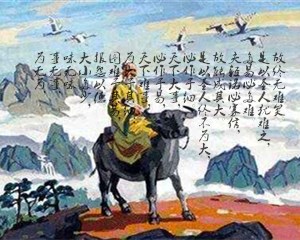(单词翻译:单击)
译文:以无为的态度去有所作为,以不滋事的方法去处理事物,以恬淡无味当作有味。大生于小,多起于少。处理问题要从容易的地方入手,实现远大要从细微的地方入手。天下的难事,一定从简易的地方做起;天下的大事,一定从微细的部分开端。因此,有“道”的圣人始终不贪图大贡献,所以才能做成大事。那些轻易发出诺言的,必定很少能够兑现的,把事情看得太容易,势必遭受很多困难。因此,有道的圣人总是看重困难,所以就终于没有困难了。
本章旨在阐发“无为而无不为”的道理,也可以说是一种处世哲学。老子讲“为无为,事无事,味无味”的道理。从前几章的内容来看,老子反对以烦琐的禁令去捆住人民的手脚限制和扰乱百姓的生活,要想有所作为,就必须采取顺应自然的态度,必须以平静的思想和行为对侍生活。他提醒人们注意,做任何事情都是从小到大,由少到多,由易到难的。

《道德经》(第六十三章)
为无为,
事无事,
味无味。
大小多少,
报怨以德。
图难于其易,
为大于其细;
天下难事,
必作于易,
天下大事,
必作于细。
是以圣人终不为大,
故能成其大。
夫轻诺必寡信,
多易必多难。
是以圣人犹难之,
故终无难矣。
Chapter 63
Act through non-action,
Handle affairs through noninterference,
Taste what has no taste,
Regard the small as great, the few as many,
Repay resentment with integrity.
Undertake difficult tasks by approaching what is easy in them;
Do great deeds by focusing on their minute aspects.
All difficulties under heaven arise from what is easy,
All great things under heaven arise from what is minute.
For this reason,
The sage never strives to do what is great.
Therefore,
He can achieve greatness.
One who lightly assents will seldom be believed;
One who thinks everything is easy will encounter much difficulty.
For this reason,
Even the sage considers things difficult.
Therefore,
In the end he is without difficulty.
更多精品翻译素材,敬请关注可可英语。


